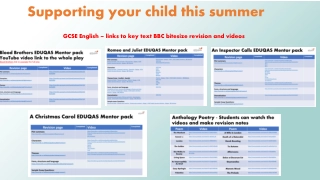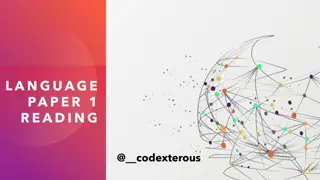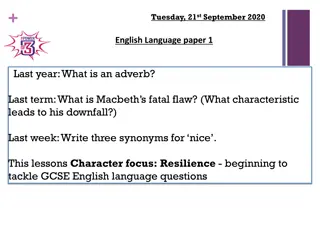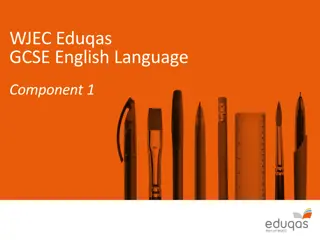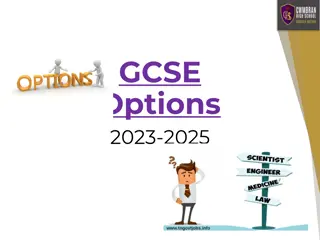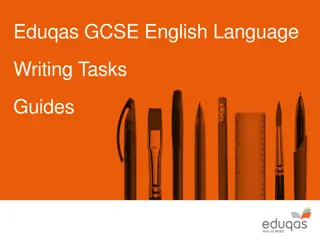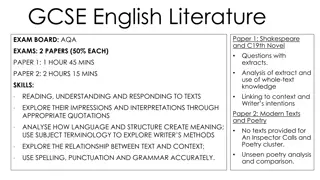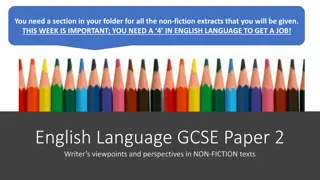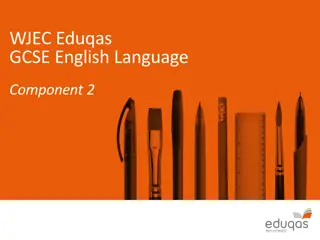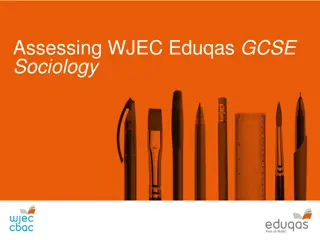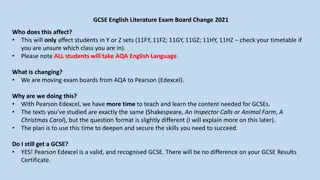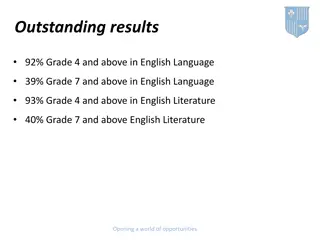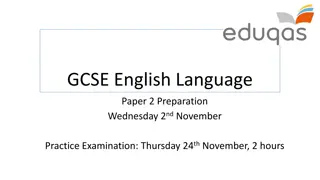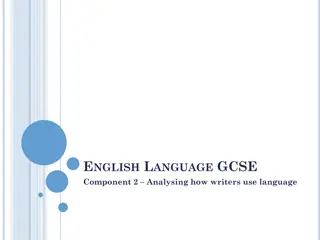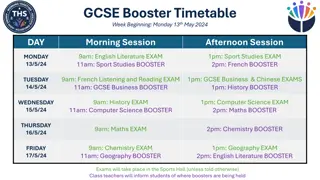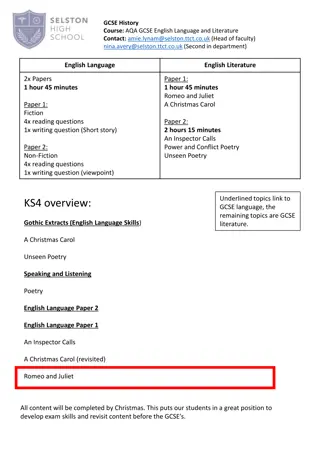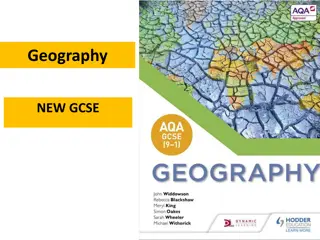GCSE English Language Assessment Overview
This content outlines the assessment structure for GCSE English Language, covering paper details, assessment objectives for reading, and session agenda for Autumn 2015. It includes information on unseen texts, creative writing, transactional writing, and evaluation. Students will be assessed on reading comprehension, analysis of texts, and writing skills.
Download Presentation

Please find below an Image/Link to download the presentation.
The content on the website is provided AS IS for your information and personal use only. It may not be sold, licensed, or shared on other websites without obtaining consent from the author. Download presentation by click this link. If you encounter any issues during the download, it is possible that the publisher has removed the file from their server.
E N D
Presentation Transcript
Click to edit Master title style Click to edit Master text styles Second level Third level Fourth level Fifth level Network events GCSE English Autumn 2015
Click to edit Master title style Session Agenda Click to edit Master text styles Second level Third level Fourth level Fifth level 19thCentury unseen texts An overview of the specs Spoken Language endorsement What is evaluation? Planning Questions and ideas for next network event
Click to edit Master title style Click to edit Master text styles Second level Third level Fourth level Fifth level SPECIFICATIONS OVERVIEW
GCSE English Language Click to edit Master title style Paper 1 1 hr 45 mins (40%) Section A: Unseen 19thCentury fiction Extract will be approximately 650 words in length Shorter response questions will focus on close analysis of the text; longer response questions will ask students to show their understanding of the whole text Paper 2 2 hrs (60%) Section A: Comparison of two unseen texts from the 20thand 21stcentury One non-fiction; one literary non-fiction Extracts will be approximately 1000 words in total Shorter response questions will focus on close reading of the texts; longer response questions will ask students to compare the texts Click to edit Master text styles Second level Third level Fourth level Fifth level Section B: Creative Writing Choice of 2 tasks linked to the theme of the 19thcentury fiction One task will include images to help students address the task Audience and purpose along with SPaG will be assessed Section B: Transactional writing Choice of 2 tasks linked to the theme of the texts Newspaper articles, letters etc Audience and purpose along with SPaG will be assessed
GCSE English Language Click to edit Master title style Assessment objectives for Reading Click to edit Master text styles Second level Third level Fourth level Fifth level AO Assessment objective % in GCSE AO1 Identify and interpret explicit and implicit information and ideas Select and synthesise evidence from different texts 7.5 AO2 Explain, comment on and analyse how writers use language and structure to achieve effects and influence readers, using relevant subject terminology to support their views Compare writers ideas and perspectives, as well as how these are conveyed, across two or more texts Evaluate texts critically and support this with appropriate textual references 15 AO3 8.75 AO4 18.75
GCSE English Literature Click to edit Master title style Paper 1 1 hr 45 mins (50%) Section A: Shakespeare Two questions One based on a 30-line extract and one on the whole play Paper 2 2 hrs 15 mins (50%) Section A: 19thCentury fiction Two questions One based on a 400-word extract and one on the whole novel Click to edit Master text styles Second level Third level Fourth level Fifth level Section B: Post-1914 British Drama or Prose Students study EITHER drama or prose Choice of essay questions SPaG is assessed Section B: Poetry One question comparing one named poem from the chosen anthology collection with another of the student s choice from the collection One question comparing two unseen contemporary poems
GCSE English Literature Click to edit Master title style Assessment objective AO % in GCSE 37 Click to edit Master text styles Second level Third level Fourth level Fifth level support and illustrate interpretations AO2 Analyse the language, form and structure used by a writer to create meanings and effects, using relevant subject terminology where appropriate AO3 Show understanding of the relationships between texts and the contexts in which they were written AO4 Use of vocabulary and sentence structures for clarity, purpose and effect, with accurate spelling and punctuation AO1 Read, understand and respond to texts Students should be able to: maintain a critical style and develop an informed personal response use textual references, including quotations, to 42 16 5
GCSE English Literature Click to edit Master title style Paper 1 Set Texts Section A: Shakespeare Macbeth The Tempest Romeo and Juliet Much Ado about Nothing The Merchant of Venice Twelfth Night Paper 2 Set Texts Section A: 19thCentury fiction Jane Eyre Great Expectations Dr Jekyll and Mr Hyde A Christmas Carol Pride and Prejudice Silas Marner Frankenstein Section B: Anthology poems 15 poems in each collection Click to edit Master text styles Second level Third level Fourth level Fifth level Section B: Post-1914 British Drama or Prose Animal Farm Lord of the Flies Anita and Me The Woman in Black An Inspector Calls Hobson s Choice Blood Brothers Journey s End Relationships Conflict Time and Place
Click to edit Master title style Click to edit Master text styles Second level Third level Fourth level Fifth level Spoken Language Endorsement
Spoken Language endorsement Click to edit Master title style Spoken language assessments will be assessed by teachers (with provision for students to be directly assessed by the exam boards where desirable or necessary) using a set of criteria that will be common across all exam boards. Click to edit Master text styles Second level Third level Fourth level Fifth level be called Not Classified . There will be three levels of achievement, Pass , Merit and Distinction , and one outcome indicating the required standard was not met. This will A student must meet all of the criteria in relation to a level to be awarded that level. Spoken language assessments may be externally assessed by exam boards and/or internally assessed by teachers, using criteria set by Ofqual Exam boards will monitor the assessment of spoken language where this is undertaken by teachers by requiring schools to submit audio-visual recordings of a sample of their students.
Marking Criteria Click to edit Master title style General Criteria To be awarded a Pass, Merit or Distinction a Learner must be audible, and Click to edit Master text styles Second level Third level Fourth level Fifth level use Spoken Standard English which, for the purposes of the spoken language assessment, means that a Learner must be intelligible, and generally use language appropriate to the formal setting of the presentation.
Marking Criteria Click to edit Master title style Pass Merit Distinction In addition to the general criteria, to be awarded a Pass a Learner's performance in his or her spoken language assessment must meet all of the following criteria expresses straightforward ideas/information/ feelings, makes an attempt to In addition to the general criteria, to be awarded a Merit a Learner's performance in his or her spoken language assessment must meet all of the following criteria expresses challenging ideas/information/ feelings using a range of vocabulary, organises and structures his or her presentation clearly and appropriately to meet the needs of the audience, achieves the purpose of his or her presentation, and listens to questions/feedback responding formally and in some detail. In addition to the general criteria, to be awarded a Distinction a Learner's performance in his or her spoken language assessment must meet all of the following criteria expresses sophisticated ideas/information/feelings using a sophisticated repertoire of vocabulary, organises and structures his or her presentation using an effective range of strategies to engage the audience, achieves the purpose of his or her presentation, and listens to questions/feedback, responds perceptively and if appropriate elaborates with further ideas and information. Click to edit Master text styles Second level Third level Fourth level Fifth level organise and structure his or her presentation, makes an attempt to meet the needs of the audience, and listens to questions/feedback and provides an appropriate response in a straight forward manner.
Format of presentation and Audience Click to edit Master title style Format: Could include: (a) A speech or talk by a Learner, followed by questions from the audience or (b) a formal dialogue, such as an interview where the Learner is able to prepare extended responses to questions or prompts which have been shared in advance, followed by questions from the audience. Click to edit Master text styles Second level Third level Fourth level Fifth level Audience: (a) an audience consisting of at least two people can be more likely to create the circumstances under which a Learner can demonstrate the knowledge, skills and understanding necessary to reach the higher specified levels of attainment in the spoken language assessment. (b) an audience should be composed of individuals able to provide the Learner with opportunities to respond to appropriate questions
Recording and monitoring Click to edit Master title style OfQual require that: Click to edit Master text styles Second level Third level Fourth level Fifth level (b) it uses those recordings as part of the means by which it determines whether or not (i) the spoken language assessment remains fit for purpose, and (ii) the criteria against which Learners' performance is differentiated are being applied accurately and consistently by Assessors in different Centres and by Assessors in the same Centre. Edexcel will only require centres to record a sample of students rather than the whole cohort. a) each Centre which delivers spoken language assessments provides the awarding organisation with a complete and unedited audiovisual recording of the evidence generated in that assessment by a sample of Learners,
Click to edit Master title style Click to edit Master text styles Second level Third level Fourth level Fifth level 19thCentury Unseen Extracts
Dynamic Reading: An Investigative Paradigm Click to edit Master title style To improve their reading skills, students will be: collecting, classifying, noticing, speculating, predicting, adapting, substituting, experimenting, inventing, making. Click to edit Master text styles Second level Third level Fourth level Fifth level Experiment Curiosity Reflection Observation
Developing Dynamic Readers Click to edit Master title style Readers who: Click to edit Master text styles Second level Third level Fourth level Fifth level envisage and predict, through exploratory talk, by writing next chapters, extra scenes, fan-fiction, translating into performance or media text question and challenge by investigating the form and language of the text make connections with other texts, narratives, media, genres intertextuality Speculate on different readings, meanings and authorial intentions play with ideas by changing the form, the narrative, the genre, identities of the characters keep options open as they read.
Lets Think in English 19thCentury Fiction Click to edit Master title style An Occurrence at Owl Creek Bridge (1890): Click to edit Master text styles Second level Third level Fourth level Fifth level students to consider the implications of the man s watch slowing down and other evidence; The activity uses Ambrose Bierce s short story An Occurrence at Owl Creek Bridge and part of the film version of the story. The reading of the story is stopped twice: firstly, to enable and secondly, to ask students to deduce the ending of the story. This process explores the methods by which Bierce builds complex alternative possibilities in an apparently simple action story, while also foreshadowing the surprise ending.
Click to edit Master title style Click to edit Master text styles Second level Third level Fourth level Fifth level AO4 - Evaluation
What is evaluation? Click to edit Master title style Questions on both papers will ask students to evaluate how well the writer achieves something (e.g. creating tension) In exemplar responses the greatest issue was students producing an AO2 answer: Click to edit Master text styles Second level Third level Fourth level Fifth level 1. focus on how well , not how 2. use evaluative language opinion, judgement 3. focus on ideas, events, themes and settings.
Levels for Evaluation Click to edit Master title style Click to edit Master text styles Second level Third level Fourth level Fifth level
Click to edit Master title style Click to edit Master text styles Second level Third level Fourth level Fifth level Planning
Click to edit Master title style Planning Click to edit Master text styles Second level Third level Fourth level Fifth level Are all your plans tied down to block units, or have you begun to introduce continuous units? Is enough time devoted, explicitly and systematically, to the teaching of writing? How are you going to incorporate Spoken Language?
Click to edit Master title style Contact information English Subject Advisor, Clare Haviland: Click to edit Master text styles Second level Third level Fourth level Fifth level http://www.edexcel.com/Subjects/English/Pages/Default.aspx teachingenglish@pearson.com Tele: 0844 372 2188 English forum look at and participate in: www.community.edexcel.com/english/default.aspx Twitter: www.twitter.com/EnglishSubAdv www.edexcel.com/learningforabetterfuture


